This month's edition of Eye on IESE: MBA Class of 2013 Graduation, Spring Games, elBullifoundation, The Financial Times has ranked IESE Business School executive education programs second in the world. Don't miss: MBA Alumni Reunion 2013, New York Breakfast with Prof. Sandra Sieber.
May Edition: Eye on IESE
Seeds of Change

Responsible investment is moving from being a niche in the asset management universe to increasingly becoming mainstream. In Europe, especially, it appears to be taking off. This article identifies some of the key drivers and the challenges that responsible investment poses to investors and managers as they try to take this novel field and embed it into their institutional practices.
Looking to the future, the author highlights three areas that he believes will need close attention: new financial strategies to deal with problematic industries; the role of Chief Sustainability Officer will become increasingly strategic; and the transparency requirements being demanded for public companies will need to apply to private ones, too, otherwise the diffusion of these practices will only be partial and their impact greatly reduced. Though much remains to be done, the author believes this is an opportune moment for institutionalizing responsible investment and ushering in a new, more sustainable age of capitalism.
Based on research by the author on the emergence of responsible investing in mainstream financial markets, which is supported by a five-year grant (2011-2015) from the European Research Council as well as a study on the institutionalization of the Global Reporting Initiative, published in Organization Science.
You can read the complete article by Prof. Fabrizio Ferraro in the IESE Insight magazine.
IESE's Business Angels Network Receives EBAN Prize
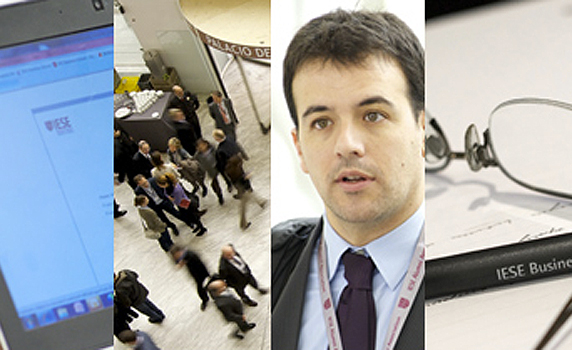
IESE's Business Angel Network was recognized as the European network of the year at the 8th EBAN Awards ceremony, which distinguished excellency across the EBAN community. Accepting the award in Vienna was IESE Prof. Juan Roure, who spearheads the 10-year old initiative. The network connects investors and entrepreneurs with innovative business ideas.
Open to IESE alumni and any entrepreneur or investor, the network does not function as a traditional investment club requiring an upfront investment commitment; instead, investment decisions are on an individual basis.
EBAN (The European Trade Association for Business Angels, Seed Funds, and other Early Stage Market Players) brings together more than 100 member organizations in 29 countries. EBAN was established in 1999 by a group of pioneer angel networks in Europe with the collaboration of the European Commission and EURADA.
Entrepreneurship plays a central role in IESE Business School's activities, which include educational opportunities and the generation of relevant research for leaders of new business ventures.
In Growing Tourism Market, Travelers’ Needs Diverge
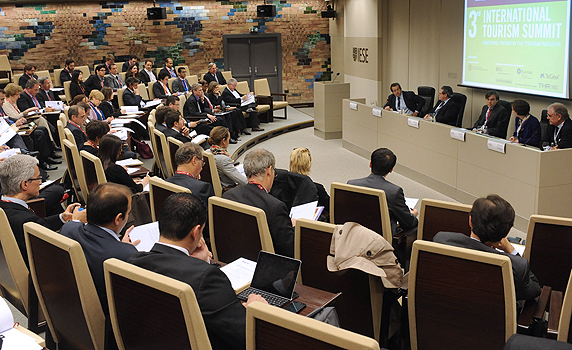
As the global tourism market grows, new technologies are helping companies connect with consumers who are seeking increasingly diverse travel experiences, said speakers at the Third International Tourism Summit, held on IESE’s Barcelona campus on May 17.
Organized jointly by IESE and the Cornell University School of Hotel Administration, the event featured speakers from around the world who addressed topics such the impact of booking platforms on the hotel industry; the rise of markets such as China and Russia; and increasingly varied consumer groups.
Organizations providing support for the summit, which carried the theme "Emerging Trends in the Tourism Industry," were BCG, Exceltur, La Vanguardia, THR and IESE's Balearic Islands Alumni Chapter.
In the opening session, IESE’s Dean Jordi Canals stressed the importance of the tourism industry in fostering cultural integration in Europe, as well as creating employment in a stagnant economy.
"If there’s an industry that can offer real job creation over the long term, it’s tourism," Canals said, who was followed by Marian Muro, director-general of tourism in the Regional Government of Catalonia. She described the region’s internationalization strategy and its focus on experiential travel, with a broader range of destinations.
"Tourism creates a global experience that allows humanity to discoverer its commonality," said Steve Carvell, associate dean for academic affairs, Cornell University School of Hotel Administration. Tourism is the single largest industry in the world and can also play a role in fostering world peace and forging agreements on key global issues, he said. "So it’s a key component of globalization for the future."
Private-Public Sector Partnerships
Increasing competition from other global destinations has chipped away at the U.S. travel industry over the past decade, said Isabel Hill, director of the Office of Travel and Tourism Industries of the U.S. Department of Commerce, in the first panel discussion, moderated by IESE Prof.Juan Roure, the summit’s academic director.
"The world has changed around us," said Hill, who explained how the Obama administration, as part of a plan to increase exports, has made boosting the U.S. tourism industry a priority. As a result of the plan, tourism grew 2.7 percent in 2012, outpacing growth of the U.S. economy as a whole, she said.
But collaborative leadership between the public and private sector is critical for continued growth, she said, and companies must see themselves as part of the policy process.
Addressing the industry in Spain, José Luis Zoreda, CEO of Exceltur, said the industry had experienced a downturn of 3.2 percent in the first three months of the year and that the Spanish tourism market has traditionally been divided equally between domestic tourism and foreign arrivals.
Compounding problems for companies in Spain are higher taxes, particularly airport taxes. A key challenge facing firms is just not just dealing with lower demand, but repositioning Spain’s tourism sector so that it has greater competitive advantage, he said.
The future of the tourism industry will be driven by the lifestyles and preferences of millennials, said Patricio Ramos, partner and managing Director, BCG Spain, who addressed how to align strategy to the future needs of travelers. A desire for speed, the latest technology and environmental sustainability will top the agenda of this demographic group.
Eulogio Bordas, president of THR International Tourism Advisors, described the "great turbulence" in traditional markets, as customers search for different kinds of experiences.
"At the end of the day, they are looking for a kind of happiness," he said, and to be competitive, companies should identify and focus on a specific segment, rather than try to be all things to all consumers. Partnerships, such as the one between the National Geographic Channel and Australia Tourism, can help companies create exciting new value propositions for travelers, he said.
A view from the top
In a session focused on the top management viewpoint, Raúl González Rodríguez , CEO, Barceló Group and president of the IESE Alumni Chapter in Balearic Islands, said that while business has dropped in markets such as Spain and Italy, markets continue to flourish.
"I am very optimistic about the future," said González Rodríguez, whose hotels in the Caribbean are attracting an increasingly diversified group of consumers from Latin American countries such as Colombia and Venezuela. The Russian market, however, is the most important group in the Caribbean for his company.
Christian A. Boyens, general manager of the Ritz Paris, described the challenges he has faced in closing the hotel until 2014 to carry out a major refurbishment project. The new Ritz Paris will feature all the luxury features of the former hotel, he said, but with many "hidden" high-tech elements to appeal to tech-savvy clientele.
Key Emitting Markets
IESE Prof. Pablo Foncillas, who moderated the next session, said global tourism is "alive and well," and will grow significantly over the next five years due to the proliferation of networked consumers.
Demand is rising for short breaks of around two to four days, as well as new forms of traveling, said Manuel Butler, general director, Tourspain and president of the European Travel Commission. By 2030, 82 percent of tourist arrivals generated in Europe will remain in Europe, he said, and the leading target group will be LOHAS, the acronym for "lifestyle of health and sustainability."
Julio Rodríguez Contreras, CCO, Vueling, said his company has aspired to maintain a low cost base, while moving into the domain of traditional airlines. By offering three fare levels, Vueling is meeting the needs of varied consumer segments, which include both business and leisure passengers, he said. A drop in domestic market has been compensated for by European travel, which has remained stable for both inbound and outbound travel, he said. Travelers from Germany, Russia and China are currently key target groups for Vueling, he said.
Growing consumption and technology are driving the Chinese travel industry today, Jun Zeng, general manager of LVMAMA, China’s leading ticket-booking firm for scenic spots. As Chinese income rises, the time Chinese consumers spend traveling will also expand, he said.
"This presents great potential for the next five years," he said, describing other trends such as the rise of independent travelers (as opposed to those going through travel agencies); growth in the number of outbound tourists to foreign destinations and increasing travel to Europe.
"China’s economy is more and more driven by consumption. Consumption has replaced investment as the biggest engine to the increase of China’s GDP," he said. Mobile apps will also play a role, with about 18 percent of consumers using mobile apps for travel booking.
A Mobile World
In a session moderated by Prof. Rohit Verma of the Cornell School of Hotel Administration, R. J. Friedlander, CEO of ReviewPro, noted that 40 percent of people now say they socialize more online that they do in the real world. Friedlander, whose firm provides customer intelligence for hotels, provided a list of best practices, including responding to tweets within 15 minutes to serve guests before, during and after their stay.
"Don't forget brand personality when communicating on mobile," advised Jimmy Nordback of Golden Gekko, whose company provides mobile solutions for companies in 30 countries. Tim Unwin, executive vice president of Rate Gain, explained how Big Data can help set prices and indicate positioning, although information has to be transformed into action otherwise it is useless.
In the next session, Joan Vilà, Managing Director, TUI Travel Accommodation & Destination, gave an account of how his company has grown since 2002 to offer a wide range of services including cruise handling, accommodation wholesales and OTAs.
"Healthy ambition" was an essential ingredient for his team, as the company grew and internationalized, he said. Vilà advised firms to go beyond focusing on a specific market and branch out to other geographic regions and consumer groups.
Game-Changing Models
Alison Copus, vice president marketing for TripAdvisor, explained that at least 80 percent of the company’s activity comes from consumers. The site currently engages with 200 million users a month and features 2.5 million business listings.
"Basically, we are always chasing the consumer around the world because it’s having good relationships with them that gives us something to sell," she said, during the session moderated by Prof. Chris Anderson of the Cornell University School of Hotel Administration. TripAdvisor’s newly redesigned mobile app will come preloaded on the Samsung Galaxy S4, allowing the platform to piggy back on Samsung’s growth.
Hotel Tonight offers consumers a quick way to book a room at the last minute, while giving hotel owners a chance to fill vacancies through an algorithm that allows them to compete for a top slot on the app, explained Heather Leisman, the company’s managing director EMEA. It is the first hotel booking platform to be built entirely for mobile "from the ground up," she said.
Miguel Moyà, the summit’s final speaker, provided an overview of Google Hotel Finder and its mapping feature, noting that the company had no intention of entering the booking business. He showed videos that gave participants a glimpse of how the newly-launched Google Wallet and Google Glass products function in real life. While Google Wallet facilitates online and in-store shopping, Google Glass provides voice-controlled, hands-free data via a lightweight headset.
The 3rd IESE International Tourism Summit on Twitter.
The Mobile Industry: Catalyst for Growth
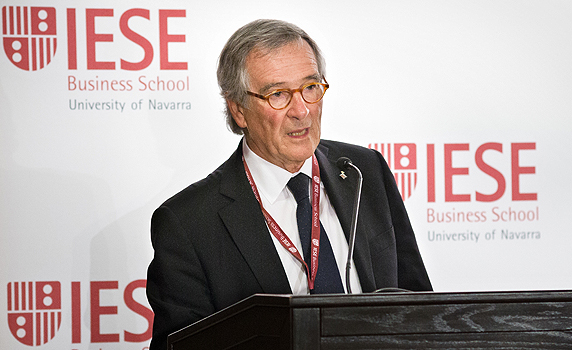
IESE’s New York Center hosted on May 17 a special conference, "The Mobile Industry: a Trigger in the World Economy," which included the participation of Xavier Trias, the mayor of Barcelona; Agustín Cordon, executive vice president of Barcelona Mobile World Capital Foundation; and Joan Tarradellas of Acció of the Catalonian regional government.
During the conference, speakers described how the city of Barcelona has evolved to become a global showcase for innovation and an industry hub for the global growth of mobile.
Barcelona has worked hard to make the city serve as truly global hub the mobile sector – which involves not just technology firms, but firms from a variety of sectors, Trias said. Enterprises are attracted to the city’s corporate tax benefits, a high quality of life and abundant, well-trained talent. These are among the features that helped Barcelona beat out other major European metropolises competing to become the Mobile World Capital, a designation established by GSMA, a global association of mobile operators and related companies.
"Barcelona has been home to the Mobile World Conference for last eight years, generating over 300 million euros in revenue from the conference alone. Being the Mobile World Capital is a great opportunity for Barcelona," said Trias. "We understood early on that the mobile industry is very important."
Additionally, Juan Manuel Barrionuevo, director of strategy at Barcelona Mobile World Capital Foundation; Barbara Mallinson, CEO of Obami; and Pau Sabrià, CEO of Olapic, shared their insights during a panel discussion focused on Barcelona’s role as the Mobile World Capital.
They highlighted Barcelona’s commitment to the mobile industry and its unique strengths, which attract start-ups as well as large, established multinationals to work together in order to better reach global markets. The panel discussion was moderated by IESE Prof. Sandra Sieber, head of the Department of Information Systems.
Sales Innovation and Revenue Go Hand in Hand

The past five years of economic crisis have taken their toll on revenue. These lean times have especially eaten away at prices and consequently profitability. The companies most affected are those bringing fewer innovations into their sales networks.
This is one of the main conclusions of a survey of 3000 general managers, marketing directors and sales directors, which was coordinated by IESE Professors Cosimo Chiesa and Julián Villanueva.
The authors point out that the lack of innovation does not necessarily cause shrinking revenue. Rather, the lack of resources due to weaker sales can preclude innovation. Other times, the relationship between innovation and revenue may be coincidental.
Read full article on the IESE Insight website.
Driving Business with Common Sense
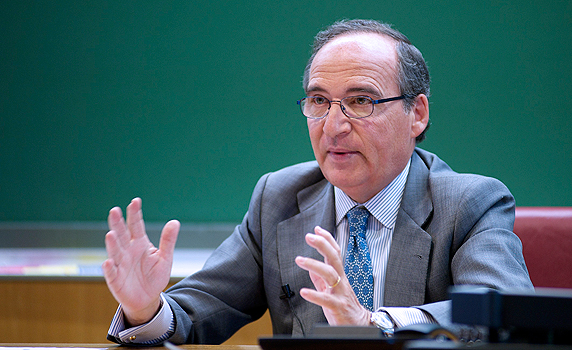
Austerity, tenacity, perseverance, love for work, leadership and future vision are among the values that have guided the life of Antonio Hernández Callejas, president of Ebro Foods. Born into a business family, at five years of age he moved from the Spanish region of Navarra to Seville, where he launched Herba, the largest rice factory in Spain.
At age 16, he started working in the family business. After earning a degree in economics and business at age 21, he jumped into the world of business. “I had to depend on the philosophy that already existed at Herba, but at the same time create value and forge new business paths. I focused on R&D and internationalization,” he said, speaking as part of the Executive MBA Global Leadership Series held on May 17 on IESE’s Madrid campus. Hernández Callejas told the EMBA participants that in order for a business to prosper, many times you have to “anticipate future events.”
He highlighted two professional achievements. In 1989, Ebro bought 60 percent of Herba, which helped accelerate the growth strategy of the company. Hernández Callejas was appointed CEO and his first assignment was to transform Ebro into the world’s leading producer of rice.
More than a decade later, in 2001, his second important opportunity arose. Ebro completed the buyout of all shares of Herba and Hernández Callejas was named vice president of the firm. In 2005, he was appointed president and CEO of Ebro Group and began managing, in addition to rice, the dairy and sugar businesses.
A sustainable business
He next planned a radical change in the business model. To be sustainable, the company had to be global, brand-conscious, profitable and secure. “You can´t be afraid of change,” he said. For that reason, he decided to shed the dairy and sugar businesses and focus exclusively on rice, incorporating pasta and sauce businesses into the group’s activities. “We were lucky with our strategic plan,” he said.
Gradually, Ebro Foods bought factories and local brands in countries such as Portugal, Belgium, the United Kingdom and the United States. Today, the company is the world leader in the rice sector and the second-largest global pasta maker. Ebro Foods has activities in more than 30 countries, with 93 percent of sales from outside Spain, a turnover of €2.1 billion, an EBITDA of €300 million and a debt of €240 million. “Over the last eight years, we have managed to become a more global company that is more cohesive and respected among multinationals. We have moved from being an industrial group to a brand-conscious group,” he said.
This year, Ebro Foods implemented a new strategic plan. “We want to strengthen and secure everything we already have because emerging markets represent a threat to our activities.” Another goal is to maintain growth without diverging from the essence of the company. “Continually reinventing the business and integrating initiatives throughout the rest of the organization is vital,” he said.
Prudence and common sense
For Hernández Callejas, common sense andprudence are essential for leading a business. “The company, without common sense, will follow paths that are not beneficial,” he said. In this sense, he outlined some of the guidelines that define his management at Ebro Foods.
He puts significant emphasis on detail, even when taking on large operations. “I am also in favor of fostering creativity and listening to those around me; speed; agility in taking decisions; and being accessible,” he said.
In addition, he is in favor of optimizing the full potential of the firm, setting an example when taking action and supporting interaction among collaborators. “I want people to feel comfortable in the company, to have a good time,” he said. In fact, respect for teamwork is a basic part of his philosophy. “I have always rejected a financial view of the firm. I support maintaining a business culture without constraints,” he said.
Antonio Hernández Callejas is a discreet business leader who was awarded the Knight of the National Order of Merit by the president of France in 2007.
Prof. Peñalva Named to Corporate Governance Commission
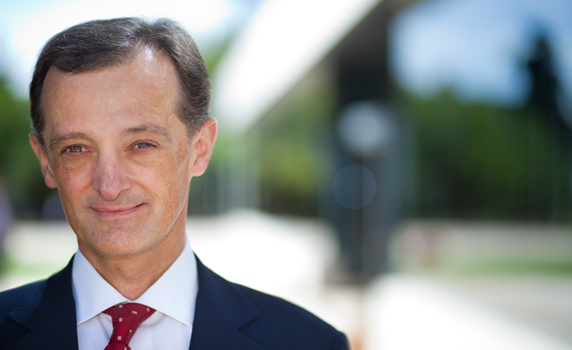
Fernando Peñalva, professor and secretary general at IESE Business School, has been appointed a member of the newly-created Commission for Improved Corporate Governance. The group was formed to foster greater transparency and better corporate governance practices among Spanish companies. Peñalva will represent the private sector on the commission, which will carry out a study over the next four months and make recommendations for improving efficiency and responsibility among company managers. The goal of the initiative is align Spanish standards with the highest global
criteria.
Among the commission's key objectives will be to strengthen the role of shareholder boards in controlling managers' compensation policies; to research the possible creation of a Code of Best Practices for non-public companies; and to fortify the role of administrators and their commitment to increasing company value and adequate returns for shareholders.
Peñalva serves as secretary general of IESE, is member of the school's Executive Committee and is professor in the Department of Accounting and Control. He holds a Ph.D. in Business Administration (accounting) from the University of California-Berkeley. Throughout his career, Peñalva has focused on the field of business accounting, including areas such as accounting models, compensation systems and corporate governance. His research has been published in international journals such as the Journal of Business and Finance and Accounting, European Accounting Review and the Review of Accounting Studies.
In addition, he has received numerous awards such as the Carlos Cubillo Valverde prize, in its 7th and 8th editions, for his work in the field of accounting, which is presented by the Spanish Association of University Accounting Professors (Asociación Española de Profesores Universitarios de Contabilidad (ASEPUC) and the Instituto de Contabilidad y Auditoría de Cuentas (ICAC). He is a member of the Commission for Accounting Principles and Norms of the Spanish Association for Accounting and Management (Asociación Española de Contabilidad y Dirección, AECA) and has served as a member of the Research Committee of the European Accounting Association's annual conference.
Online Communication Revolution
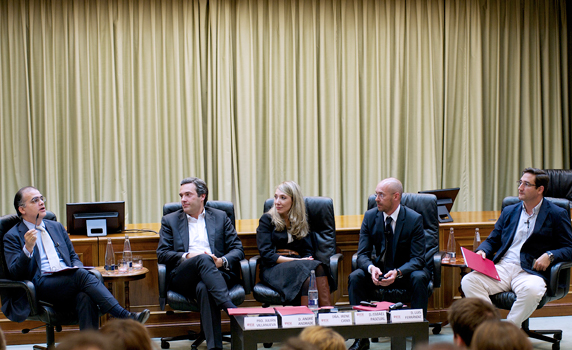
What new challenges do online media present for brands? How has planning changed since the disruption of digital media? What are the new trends in the world of communication? What are the forces shaping new media strategies? These were among the questions addressed during the Continuous Education session “New Media Strategies,” held May 21 on IESE’s Madrid campus.
Organized by IESE’s Alumni Association, the event was moderated by IESE Prof. Julián Villanueva and Luis Ferrándiz, partner in the agency DNA. “The digital world has brought with it many new channels that are not always easy to integrate with traditional ones,” said Villanueva.
André Andrade, CEO of Aegis Media Iberia, said that two trends have revolutionized the communication world in recent years: globalization and convergence. In his opinion, globalization has forced brands to adjust their positioning in every country where they are present.
At the same time, technological change has turned consumers into powerful actors who avidly share data and information with each other in real time through the distinct digital platforms they have at their disposal. “All this is interconnected, interdependent and transparent,” he said.
Everything has changed
Andrade said that in recent years the providers of global infrastructure have changed. Companies such as Apple, Amazon, Facebook and Microsoft have acquired greater importance in the new media panorama. “The point of commitment to the brand and the point of sales transaction have moved closer. This means that companies have to change their media strategies in a radical way,” he said.
In this new communications ecosystem, consumers play a central role and all marketing planning centers on them. “Everything has changed. Today, due to a relatively low investment in production and distribution, digital content can reach many more people,” he said.
Irene Cano, country manager of Facebook, described three key features of new media strategies: convergence, measurement and social DNA. “Media and digital support have gained ground. Today, you cannot plan a campaign with tight platforms. You have to take everything into account because everything is interrelated. You should follow an integrated strategy,” she said.
“It is becoming increasingly difficult to capture the attention of the consumer. There have been changes in consumer habits and this is something to keep in mind,” she said. At the same time, she admitted that in online publicity strategies, the correlation between clicks and sales remains unclear, so more reliable measurement systems need to be developed.
Efficient segmentation is one of the key advantages that online media can bring to media strategy, she said. “To be social is not just a goal. It is a means for achieving objectives,” she said. She also outlined four components that form part of social marketing: connecting, interacting, influencing and integrating. “We recommend generating online content through users, because they are the great generators of ideas,” she said.
Obsession with sales
Cano also stressed continued investment in new platforms and cautioned against the “obsession” that many companies have about selling via the internet. “It doesn´t make sense. The important thing is to sell and that the brand uses all the opportunities offered by available platforms,” she said.
Ismael Pascual, head of integrated communication at Coca-Cola, said that many companies have a presence on social media but don’t know really know what to do with it. “Creativity, finding new spaces and knowing how to adapt content to digital media are essential in order for brands to be successful with online content,” he said.
He also said that, in spite of efforts made by many companies to generate their own online content, there are major gaps in ROI measurement systems. Yet it remains necessary, he said, to invest a portion of communication budgets to experimentation and testing digital sales. In new media strategies, offer and demand should create relationships that bring added value.
In spite of advances made by organizations in their digital strategies, Andrade concluded with this message: “The financial health of many internet companies remains very complicated.”
Four Steps to Successfully Manage Your Calendar
You need to control your calendar before it starts to control you, says IESE Lecturer Miquel Lladó. In order to make things happen, rather than have them happen to you, it is essential to strike a balance in your personal and professional calendars and to think in depth about how you go about this. You also need to remember that your calendar impacts on the calendars of the people around you.
The Inside Track to Staying Ahead
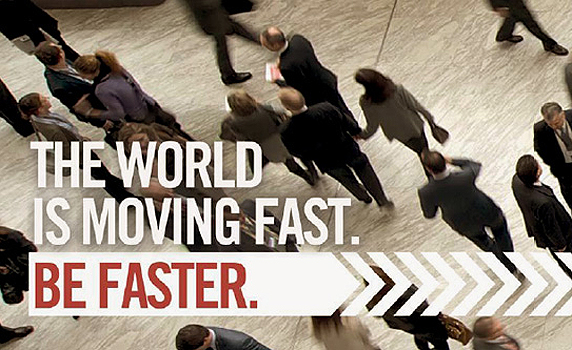
The world is changing faster than ever. Six years ago no one had a smartphone, now more than a billion people use one. And not only are these technologies new, they are hugely disruptive, radically changing the way we live and how we do business.
Change is exciting, but it brings with it uncertainty and decision-making in these vertiginous times is more fraught with doubt than ever. This is why next week IESE is launching its "Fast Forward: Building Tomorrow’s Business World" program, designed to give executives an immediate boost and to endow them with the confidence that they are making informed decisions in order to compete more effectively.
Keynote speakers include Pankaj Ghemawat, the Anselmo Rubiralta Professor of Global Strategy at IESE Business School, whose most recent book, World 3.0: Global Prosperity and How to Achieve It won the 50 Thinkers Book Award for best business book published in 2010-2011.
Another keynote speaker is Robin Sharma, who shot to fame with his book The Monk Who Sold His Ferrari and has become one of the world’s leading authorities on how to develop leadership at all levels of an organization. He will give a talk titled “Winning Without a Title: The Winning Leadership Lessons to Build a Great Organization.”
They are joined by Ermenegildo Zegna of the eponymous Italian fashion business who will talk about “The Challenges and Opportunities of a Global Family Business” and Halla Tómasdóttir, co-founder of Audur Capital financial services, who has been instrumental in rebuilding Iceland’s economy since its collapse in 2008. Her talk is titled “Transforming Organizations to Attract and Retain “Triple Capital”: Human, Social and Financial.”
Idunn Jónsdóttir, director of IESE’s International Open Programs, explains that the five-day program "will allow the participants to identify future areas for potential growth and increase their competitiveness, as well as providing inspiration and motivation." The program will include sessions dealing with all areas of management and cover a wide range of topics. Those taking part must follow one of three academic tracks: challenges and opportunities in growth markets; reinventing a business project; or marketing and the digital age. In addition, there will be parallel sessions on various fields of research. Plenary sessions on the global economy; leadership and innovation; decision-making in times of uncertainty, and information technology and communication will be led by Pedro Videla, Paddy Miller, Miguel Ángel Ariño and Sandra Sieber, respectively.
Watch Fast Forward Program videos:
The World Is Moving Fast. Be Faster
Welcome to the Fast Forward Program
Fast Forward Program
The Pillars of IESE
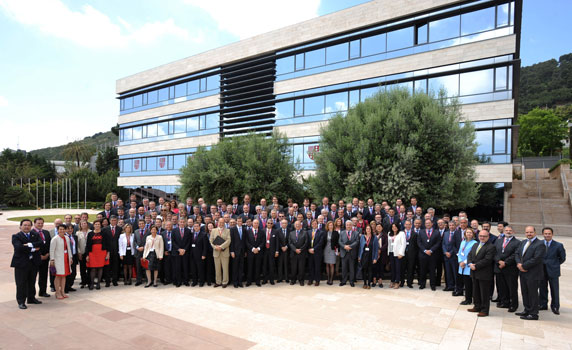
The invaluable help provided by Sponsoring Companies is reinforced every year with new members who are welcomed by IESE, along with those that have supported the school since the beginning.
Anuntis, Banco Madrid, Caser, Clear Channel, Coface, El Consorci de la Zona Franca de Barcelona, Encofrados J. Alsina, Línea Directa Aseguradora, Meta4, PepsiCo, Remitsa Invest, Saba Infraestructuras, Société Générale and Zardoya Otis have all joined IESE as sponsoring companies over the past year. Dean Jordi Canals gave them diplomas of accreditation at the Annual Meeting of Sponsoring Companies, Academic Chairs and Research Centers held on May 13 on IESE’s Barcelona campus. He also mentioned the Chair of Sustainability and Business Strategy created for IESE by Schneider Electric, which also received a diploma.
“There are four dimensions to companies that we need to focus on now,” said Canals during his presentation. “The first is governance with a long-term view. The second is to focus on clients, independent of the product or service offered. Companies that really take care of their clients are the ones that will survive. The third dimension derives from the first two: people are fundamental to the company.” All of which leads to the fourth dimension – the pursuit of excellence in management.
Prof. Juan Carlos Vázquez-Dodero talked about the “new anthropology” required if business is to play the part it needs to play in society and said that IESE aims to provide society with professionals who will improve it. “IESE is committed to the development of an integrated concept of the company,” said Prof. Vázquez-Dodero. “The point of companies is financial, but their mission must be humane and therefore they must include the psychological, social and moral dimensions as well as the purely financial,” he said.
In conclusion, Prof. José M. González-Páramo celebrated the fact that “the markets are becoming active.” “The structural reforms are advancing, although the state of the Spanish economy is still complex,” he said, adding that “the reforms have been announced and are in place but they urgently need to be completed.” He added that we need to be aware of the key economic debates: How to stage an economic recovery without credit? “It’s possible, but an economic recovery without credit is slow and fragile,” he said.
Healthy Employees Build Healthy Businesses

CPR courses. Help to quit smoking. Seminars on stress management. More companies, particularly in the United States, are taking the well-being of their employees seriously, and offering health programs to promote exercise, nutrition and care of the body and mind among their employees.
These policies are shown to have a positive impact on the company through reduced absenteeism, greater productivity and a better working environment, while employees express higher levels of engagement, motivation and satisfaction.
A new report by IESE's International Research Center on Organizations (IRCO) presents a roundup of best practices among multinational companies worldwide, making specific recommendations for companies looking to implement these programs.
Read full article on the IESE Insight website.
“If You Don’t Fail It Means You’re No Longer Learning"
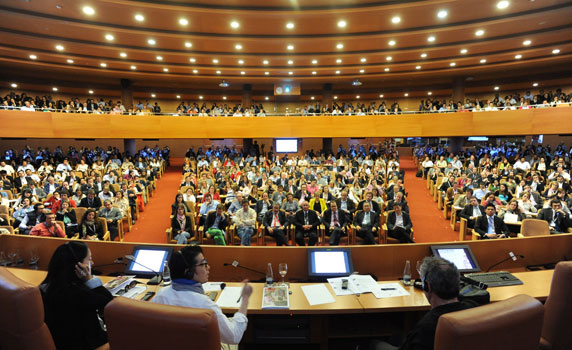
More than 1,300 MBA graduates attended the reunion held on the Barcelona campus on Saturday where they participated in sessions given by Wan Gang, China’s minister of science and technology, the celebrated chef Ferran Adrià and the Japanese architect Makoto Tanijiri.
During the day IESE professors also led numerous sessions whose topics ranged over market orientation, building companies in the digital age, how to enhance portfolio return, the outlook for the global economy and the rise of multichannel retailing, among many others.
In a meeting moderated by Prof. Pedro Nueno, Gang encouraged Spanish companies to collaborate with China in exchange programs for mutual scientific and technological development. He said that international companies need to compete to invest in sectors such as the auto industry, infrastructures and biomedicine. He said that China expects to have 170,000 electric vehicles on the road by 2015, four times the current fleet.
Prof. Mike Rosenberg moderated the session in which Ferran Adrià and Makoto Tanijiri talked about innovation and creativity. Adrià said that few people manage to remain creative for more than 10 years and set out an organizational framework to encourage innovation.
"We are studying and carrying out a scientific analysis of what is the DNA of creativity and how we can be both creative and more efficient. You need to create an organization and a model that encourages and facilitates creativity," he said, adding that you need to keep an open mind. "I don’t know anything about cooking, I have to learn every day. You need to be open to new ideas but at the same time you have to believe in yourself."
Tanijiri then presented an imaginative slide show that illustrated ways of thinking and looking at things from a different angle. "Simple ideas can have dramatic impact, but you have to be creative," he said. In his work as an architect he says he likes to blur the distinction between exterior and interior spaces. Asked about how he deals with failure, Tanijiri said: "If you don’t fail it means you’re no longer learning."
"You need to remain a child," he said. "Knowledge and experience can get in the way of creativity." Adrià added that when faced with tradition your first impulse must be to ask why? "You mustn’t let yourself be manipulated by tradition," he said.
“You Have to Understand a Market Before You Enter It”

Ágata Lozano’s life has always been linked to the business her family has run for four generations in the La Mancha region of Spain. Although she has always been at liberty to choose her own path, the Executive MBA ’13 student on IESE’s Madrid campus says that a sense of vocation, combined with sentimental attachment, led to her decision to carry on the family tradition.
"At first I planned to study industrial engineering but I realized that I didn’t want a purely technical career so I studied law and business studies in Madrid and Dublin with the idea of getting a broad and realistic picture of the business world. I could have chosen a career that had nothing to do with the family business but, given the massive international expansion under the third generation, it seemed the ideal environment in which to develop professionally. The family links did the rest."
As soon as she graduated, she worked in all the departments of the organization, seeing it from every angle, before ending up in the department of finance and exports in a business that now does 95 percent of its business overseas.
"The third generation did a great job once they became aware of the local market’s limitations. I had the good fortune to spend 10 years continuing this work. I also had the chance to extend my studies in San Diego (USA), which opened my eyes to other cultures. But after a decade in the company, I felt the need for something new. I said to myself: now what?"
IESE's EMBA: the best option
Lozano’s first contact with IESE came in 2010 when the school visited La Mancha to meet executives in the region. "After that first encounter, I continued to be very interested in IESE and kept in contact with various professors who recommended the EMBA program, given my profile and my knowledge about the sector."
"Before deciding to join the program I studied it in depth and what interested me was that, while I knew a lot about my sector, I knew practically nothing about other industries and I saw that the program could broaden my outlook and teach me about cases and problems similar to my own. The IESE EMBA offered me this perspective, as well as a huge number of tools, not to mention the prestige that comes from developing top executives over 50 years," she says.
Shanghai: a lesson in life
In March 2013, the EMBA program on the IESE Madrid campus held a one-week intensive module at CEIBS in Shanghai in order to give the participants a closer look at the Chinese business and socio-political context. For Lozano, the most interesting aspect of the module were the sessions and the contact with people. "We got some sense of the reality of the country, the geopolitical and economic aspects as well as the business milieu. I have a greater understanding now why they are different, why they approach work differently," Lozano says.
"Because of my job and our expansion in Asia, I’ve worked with China for many years but I now realize that I now have a better idea how they are, how they think and understand them better. In the West, we work in an active manner, we always try to anticipate. By contrast, in the East they are more reactive and reflexive. They have adapted progressively and carefully. Seeing and understanding these differences is a fundamental lesson in life for any executive who wants to expand their business. Understanding how things function in a given milieu, how they are done, how they breathe, all this is fundamental before moving into it yourself," she says. "It’s been a profoundly enriching experience which has given me a lot of food for thought and I’m sure that in future it will be extremely useful for our business."
"It has increased my self-confidence and I now believe that with hard work and enthusiasm anything is possible. Our short-term goal is to expand our product range in order to get closer to our clients and increase our international presence. There is scope for it and a great desire to achieve it."
"I Wanted to Broaden My Multicultural Horizons"
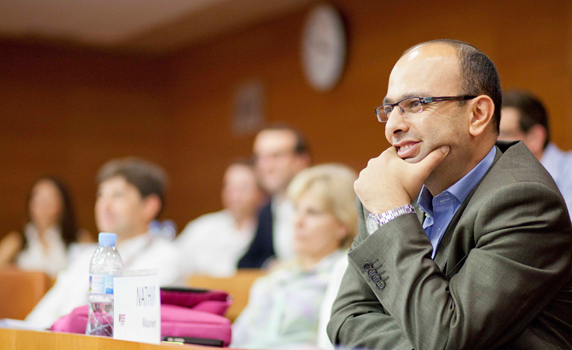
Natheer Masarweh earned a degree in chemistry from the University of Jordan and continued his education with a Master's degree in medical chemistry from the University of Sussex and another degree in industrial pharmaceutical science from the University of Manchester. After joining Hikma Pharmaceuticals in 1993 and assuming various roles in the company, he accepted the post of Vice President of Quality, Global Injectables in 2012.
"The decision to carry out IESE's Global Executive MBA was above all due to the fact that the program was held on different campuses and on different continents. I was looking for a program that would broaden my multicultural horizons and would expand my global knowledge of the business world," said Masarweh, citing the program's international modules.
"What I liked most was the link between theory and practice, which gave everything a greater meaning from a business perspective. I also liked the case methodology, which provided real examples that are relevant when examining different business environments. Overall, the Global Executive MBA has a 'special flavor' when comparing it to traditional programs. As an executive, it gives you the right tools for managing your company in an effective way. I experienced 18 interesting months that were full of challenges. And, indirectly, the program also teaches you how to balance professional life, family life and social activities," he said.
His work involves leading multicultural teams and working with different cultures. This was yet another reason that the Global Executive MBA experience was highly satisfying: "The program teaches you how to listen and leave aside your prejudices until you have the data on the table; and at the same time, you learn how to be more tolerant. Now I only hope to be able to use all that I have been taught during the program and fulfill my responsibilities as head of Quality, Global Injectables at Hikma Pharmaceuticals."
Barcelona Makes the Connection
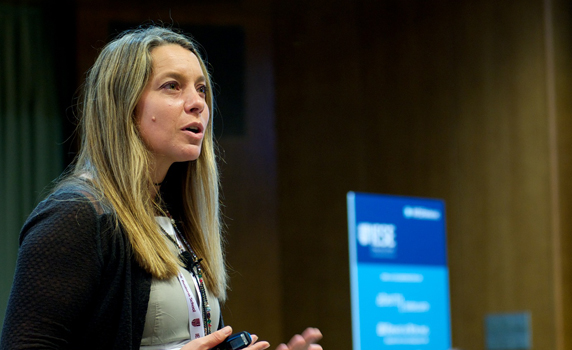
Operators in the mobile industry have to look on the demand side, know where their customers are and create platforms that will give them a global reach, speakers said at the conference "Mobile Industry: A Trigger in the World Economy." The mayor of Barcelona announced that the city aims to set an industry standard as a connected city, linking investors and entrepreneurs.
Improve Your Negotiation Technique
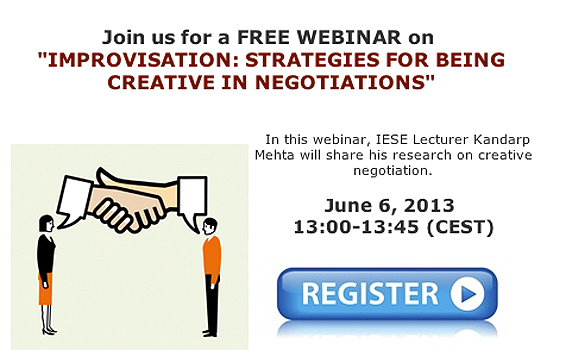
Don’t miss the next Webinar free interactive discussion on June 6 at 13.00-13.45 when you can discover how to tackle complex negotiations effectively in a wide variety of situations and achieve your business objectives. IESE lecturer Kandarp Mehta will share his research in creative negotiation in a talk titled "Improvisation: Strategies for Being Creative in Negotiations."
Mehta has pointed out that, while a great deal of our working lives centers on negotiation, little time is spent on learning how to negotiate. For example, there are both combative and collaborative negotiations and these require different approaches and distinct techniques. Mehta says that many negotiators are unable to come up with the sort of creative, integrative deals that can clinch an agreement and will talk about the five strategies he believes makes us more creative negotiators.
This webinar will serve as the perfect introduction to IESE's upcoming 3-day program High Performance Negotiator (July 22-24) which is available in Spanish as Negociar con Eficacia (July 1-3) in Barcelona.
For further information contact Aniya Iskhakava.
Changing Expatriation Policies
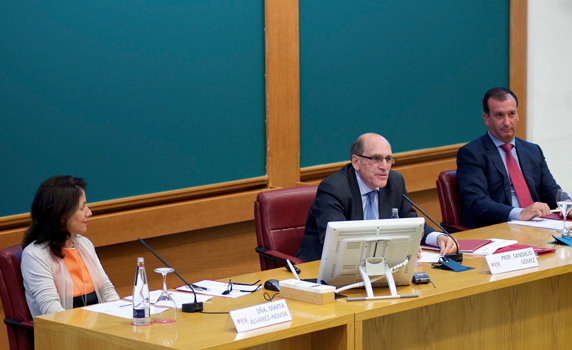
The financial crisis has had a direct impact on firms’ expatriation policies, which have speeded up in recent years. “Today expatriation is seen more than ever as vital for business to survive,” said Prof. IESE Sandalio Gómez during a Continuous Education session titled “Expatriation Policies in the Current Economic Context: The Company View,” held on the Madrid campus on May 27.
The meeting, organized by the IESE Alumni Association, discussed the main findings of the report prepared by IESE and Ernst & Young based on interviews with the heads of human resources in 30 Spanish companies with overseas operations. The report shows that 60 percent have had to modify their expatriation policies.
The expatriate profile has changed, according to Marta Álvarez-Novoa, a partner at Ernst & Young. Candidates who are willing to move to other countries are more highly qualified and organizations have to pay close attention to their careers and the flexibility with which they can exchange one for another.
Reduction of costs
She said companies are offering less compensation than before. “There is a trend towards cost cutting except when it comes to insurance and tax issues,” she said. “Before the crisis, the employees imposed their conditions, now it’s the other way round,” added Sandalio Gómez.
The fact is that, while a decade ago expatriates were improving their capacity to save, this is no longer the case. Now salaries only increase with promotion. Their salaries may stay the same, aside from incentives. "Part of the compensation for expatriates is linked to professional growth,” the professor said.
In spite of this, most employees view expatriation as a personal and professional opportunity. The report also shows that people’s partners have a greater say in whether an offer of expatriation is accepted or not. “The family is a decisive factor in whether or not it is successful,” he said.
Companies recognize that more and more employees are afraid to refuse expatriation for fear of losing their jobs. Some 83 percent of expatriates are still with the same company two years after leaving Spain. “Employees don’t dare to change their job as a result of the crisis,” said Álvarez-Novoa.
Feeling supported
Óscar Izquierdo of Ernst & Young emphasized that expatriates need to feel they and their families are supported and protected. He said that factors such as violence, quality of life and the differential in the cost of living have to be considered when designing compensation packages.
There is also better communication between companies and their expatriates and when it comes to repatriation to Spain companies usually plan six months in advance. At the same time, the report also indicates that a growing number of expatriates choose to move from one country to another. The report highlights the challenges ahead. On the one hand, companies have to devise a management team to control expatriates and, on the other, they need to learn how to manage the talent and development of these employees.
Investing in Entrepreneurship
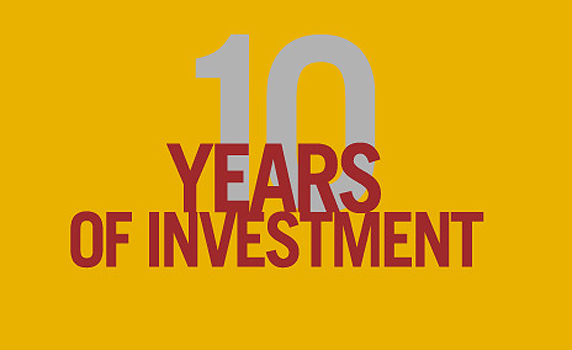
IESE's Business Angels and Family Offices Network will celebrate its 10th anniversary on June 3 with a special event titled, "Angel Investment in Spain: Building on 10 Years of Learning," and directed by IESE Professor Juan Roure. The event will take place on IESE's Madrid campus with more than 200 participants, including private investors, investment groups, family offices, venture capital funds and others involved in the financing of new enterprises.
Among the international speakers to take part will be Claude Rameau, president of France Business Angels; Maurice Gopikian, investor, Harvard Business Angels; and Luis Martín Cabiedes, IESE professor. Professors Juan Roure, Antonio Dávila and Francisco Iniesta will moderate the sessions at the event, which will close with remarks by José Manuel Soria, Spain's minister of industry.
Open to IESE alumni and all investors, as well as entrepreneurs, the Business Angels and Family Offices Network is a nexus of more than 130 entrepreneurs and investors exploring synergies in order to help create new enterprises. The network does not function as a traditional investment club requiring an upfront investment commitment; instead, investment decisions are on an individual basis.
Over the last 10 years, the network has facilitated the presentation of more than 600 projects and held more than 70 forums in Barcelona and Madrid. More than 60 investment operations have been undertaken, reflecting in excess of 15 million euros in total direct investment. Among the entities that collaborate with the network are ACC1Ó, EBAN, AEBAN, Barcelona Activa, Madrid Emprende, ENISA and Fundación Banesto.